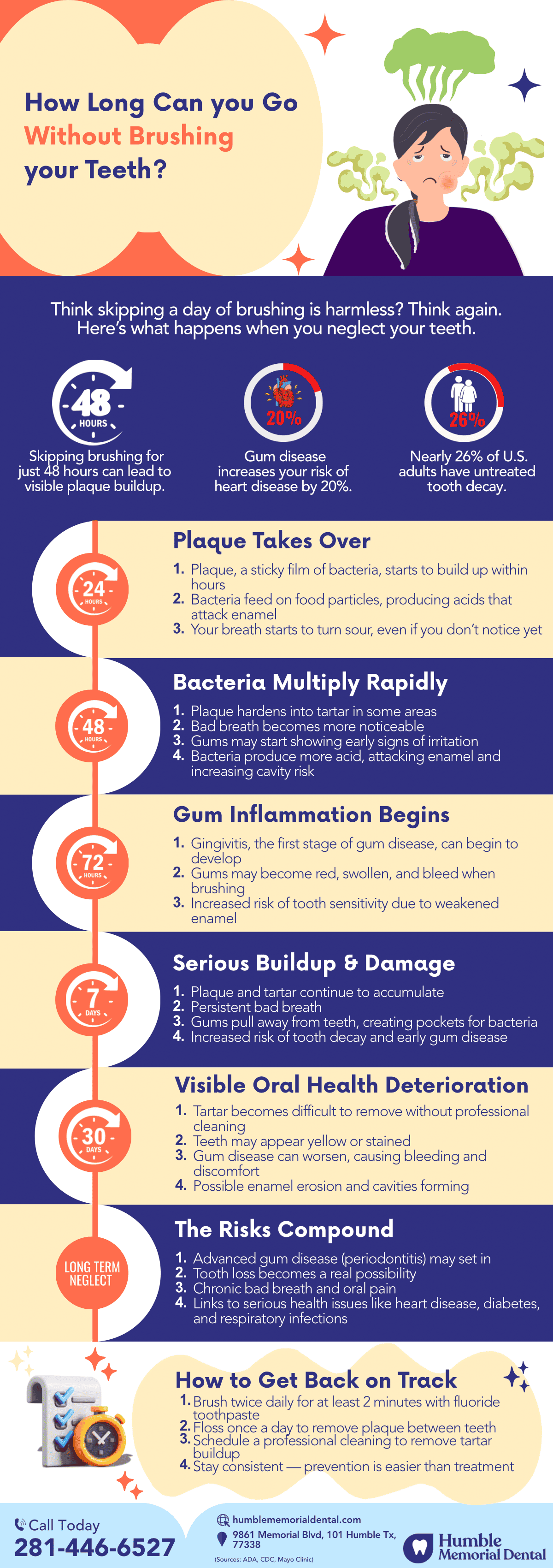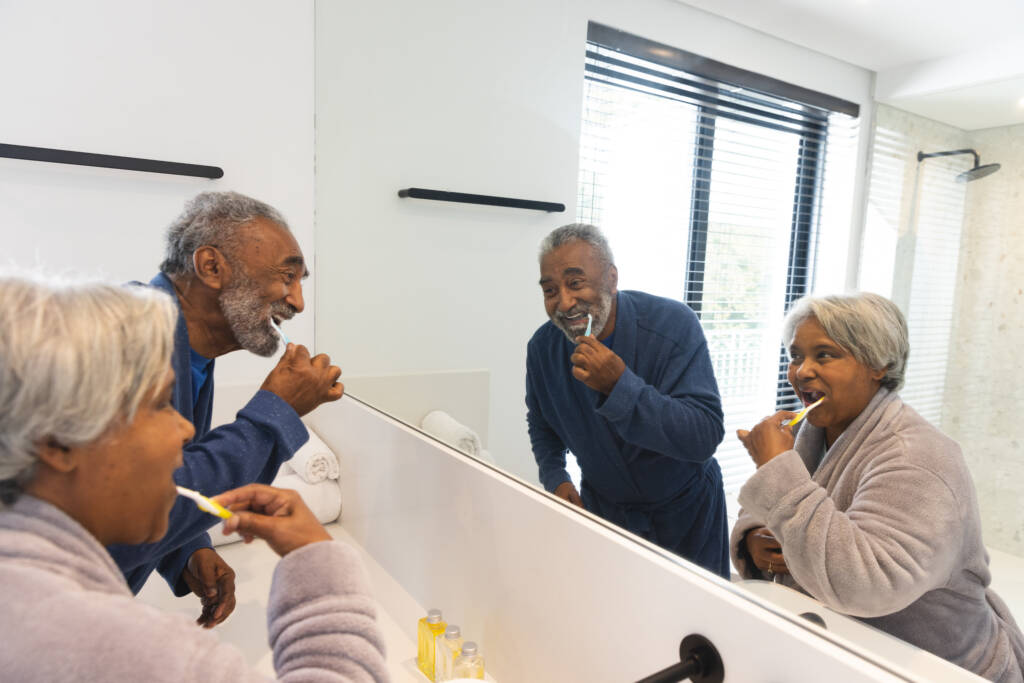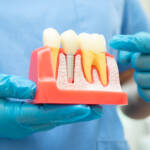We’ve all had those nights—too tired to brush, thinking, “Skipping just one time won’t hurt, right?” But what actually happens if you go without brushing? A day? A week? A month? Spoiler alert: It’s not pretty.
Let’s break it down day by day, so you know exactly what happens when you stop brushing—and why it’s best not to test the limits.
Key Takeaways
✔ Plaque starts forming within hours—brushing twice a day prevents buildup.
✔ Skipping a few days causes bad breath and gum inflammation.
✔ After a week, tartar forms, making brushing less effective.
✔ A month without brushing leads to cavities and early gum disease.
✔ After a year, tooth loss and serious infections are likely.
✔ Brushing, flossing, and regular dental visits can prevent all of this!
How Many Days Can You Go Without Brushing?
Technically, you can go as long as you want without brushing—but your teeth and gums will suffer the consequences. Most dentists agree that skipping even one day lets plaque start building up. By three days, your breath won’t just be “morning breath” bad—it’ll be noticeably unpleasant. By the one-week mark, tartar (hardened plaque) forms, making it harder to clean your teeth.
Go a month without brushing? Expect cavities, gum inflammation, and possibly the start of gum disease. And if you stretch that to a year, you’re looking at serious decay, loose teeth, and maybe even tooth loss.
In short—you shouldn’t go even one day without brushing. Twice a day, every day. It’s a small effort for a lifetime of healthy teeth.
Let’s find out more about what happens in your mouth when you don’t brush your teeth for a specific period of time.
The First 24 Hours: Plaque Begins to Form
Within minutes of skipping brushing, bacteria in your mouth start feeding on leftover food. This creates plaque, a sticky film that coats your teeth.
After a few hours, plaque starts producing acid that weakens enamel. Skip a whole day? That plaque hardens, making it tougher to remove the next time you brush.
What to do: If you miss a brushing session, brush and floss as soon as possible. Don’t wait until bedtime to fix it.
Day 2-3: Bad Breath and Bacteria Take Over
After two or three days, things get worse. Plaque keeps growing, trapping food particles and releasing foul-smelling gases. Hello, bad breath!
This isn’t just “I had garlic for lunch” breath. It’s the kind of funky, sour smell that no mint can fix. Plus, bacteria start creeping under your gums, setting the stage for gingivitis (early gum disease).
What to do: If you’ve gone a few days without brushing, grab that toothbrush immediately and floss thoroughly. Also, drink lots of water to help wash away some of that buildup.
One Week Without Brushing: Tartar Buildup and Early Gum Inflammation
Plaque that sits on your teeth for days hardens into tartar—a yellow, rock-like substance that brushing alone can’t remove. Tartar builds up along the gumline, causing redness, swelling, and bleeding gums.
At this point, you may feel your teeth are coated in grime—because they are. And bad breath? It’s no longer just “bad.” It’s gag-worthy.
What to do: You’ll need a professional cleaning to remove tartar. Brushing alone won’t cut it anymore.
One Month Without Brushing: Tooth Decay and Gum Disease Begin
After four weeks, your teeth and gums are in serious trouble. Tartar continues to grow, and cavities are now forming. Your gums may feel tender, bleed easily, and even start pulling away from your teeth.
If you’ve made it a month without brushing, you’re in the early stages of gum disease (gingivitis). And here’s the kicker—gingivitis is reversible if treated early. But if ignored, it can progress into periodontitis, a severe form of gum disease that causes permanent damage.
What to do: Get to a dentist ASAP for a deep cleaning and start brushing twice daily. No more excuses.
Three to Six Months: Serious Gum Disease and Tooth Sensitivity
By month three, your gums are in full rebellion mode. Swollen, sore, and possibly oozing pus (yes, really). The infection is now deep in your gums, attacking the bone that holds your teeth in place.
Your teeth may also start feeling sensitive because the enamel is wearing away. Eating hot, cold, or sweet foods? Painful.
What to do: This isn’t just a hygiene issue anymore—it’s a medical problem. You’ll need professional treatment to save your gums and teeth.
One Year Without Brushing: Tooth Loss and Serious Oral Infections
At this point, we’re talking about severe damage. Teeth may become loose or even fall out, and infections can spread into the jawbone and bloodstream, leading to more serious health issues.
Yes, people have ended up in the hospital from untreated dental infections. It’s not just about having bad breath or yellow teeth—your oral health affects your overall health.
What to do: If it’s been a year (or even close), see a dentist immediately. You may need deep cleanings, fillings, or even extractions to repair the damage.
Can You Reverse the Damage? What Happens If You Start Brushing Again?
The good news? If you catch the damage early, you can reverse some of it. Gingivitis can heal, and early cavities can sometimes be stopped.
The bad news? Severe gum disease and enamel loss are permanent. Once gums recede, they don’t grow back. And if cavities are too deep, you’ll need fillings—or worse, root canals.
Moral of the story? Don’t let it get to that point. Brush twice a day, floss daily, and visit your dentist regularly.

The Right Way to Brush: Are You Brushing Correctly?

Brushing your teeth seems simple enough—just scrub and rinse, right? Not exactly. Many people brush the wrong way, which can be almost as bad as not brushing at all. If you’re brushing too hard, too quickly, or missing key areas, you might not be protecting your teeth as well as you think.
Here’s how to do it right:
- Use a soft-bristled toothbrush. Hard bristles can wear down enamel and irritate your gums.
- Brush for two full minutes. Most people brush for only 30 seconds or less—nowhere near enough time.
- Use small, circular motions. Don’t scrub back and forth aggressively. Gentle circles help remove plaque effectively.
- Don’t forget your gums and tongue. Bacteria love to hide along the gumline and on your tongue, causing bad breath.
- Replace your toothbrush every 3-4 months. Worn-out bristles don’t clean as well and can harbor bacteria.
And let’s clear up a common myth—brushing harder doesn’t clean better. It can damage your enamel and make your teeth more sensitive. Gentle, consistent brushing is all you need.
Pro tip: If you’re not sure if you’re brushing properly, ask your dentist for a quick demo at your next visit. A few small changes can make a big difference!
The Importance of Professional Cleanings: Why Brushing Alone Isn’t Enough
Even if you brush and floss perfectly every day, you still need to see a dentist regularly. Why? Because plaque hardens into tartar, and once that happens, no amount of brushing will remove it.
Professional cleanings do three crucial things:
- Remove tartar and plaque buildup – Dentists use special tools to scrape away hardened tartar, which prevents cavities and gum disease.
- Check for early signs of problems – Many dental issues, like cavities and gum disease, start silently. A dentist can catch them before they become serious (and expensive to fix).
- Prevent long-term damage – Regular cleanings keep your gums healthy and prevent problems like gum recession and deep infections.
How often should you go? At least twice a year. But if you’re prone to cavities, have a history of gum disease, or wear braces, you might need more frequent visits.
Skipping professional teeth cleanings can undo all your hard work at home. So, even if you’re the best brusher in the world, don’t skip those dental visits!
Looking for Expert Dental Care in Humble?
If your oral health isn’t where it should be, Humble Memorial Dental Group is here to help. Whether you need deep teeth cleaning, cavity treatment, or you just need a dentist in Humble TX, our expert team is ready to get your smile back on track.
We offer:
✔ Gentle, thorough cleanings to remove plaque and tartar buildup.
✔ Preventive care to catch issues early and keep your teeth strong.
✔ Restorative treatments like fillings, crowns, and gum disease therapy.
Don’t wait until it’s too late. Book an appointment today—your teeth will thank you!
Final Thoughts: A Simple Habit That Protects Your Smile
Brushing your teeth takes two minutes, but skipping it can lead to months (or years) of damage. The longer you wait, the harder it is to undo the harm.
The bottom line? Don’t skip brushing. It’s one of the easiest ways to keep your smile healthy for life. Interested in more dental statistics and facts? Check out these oral health statistics.






